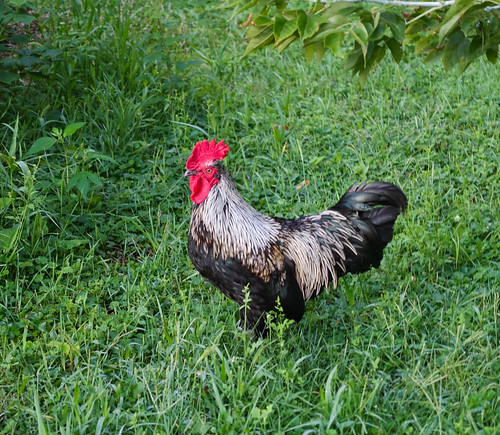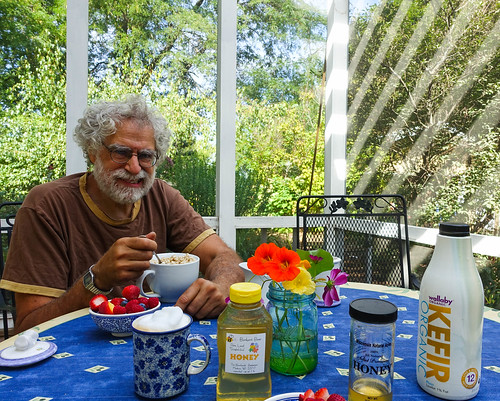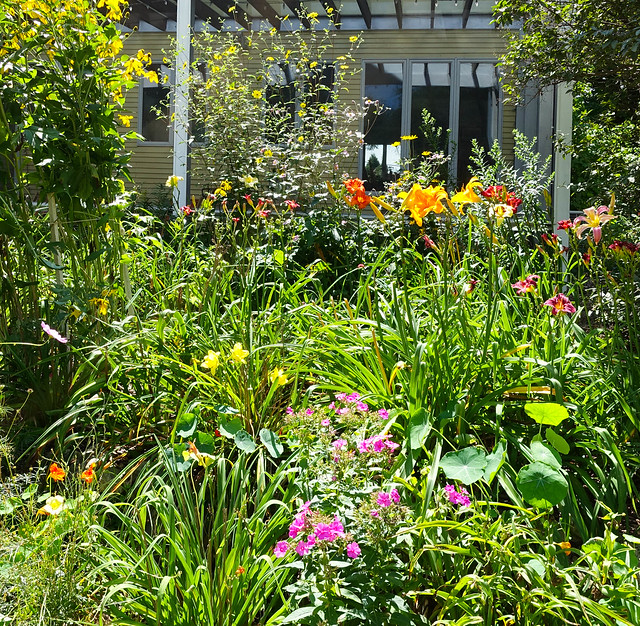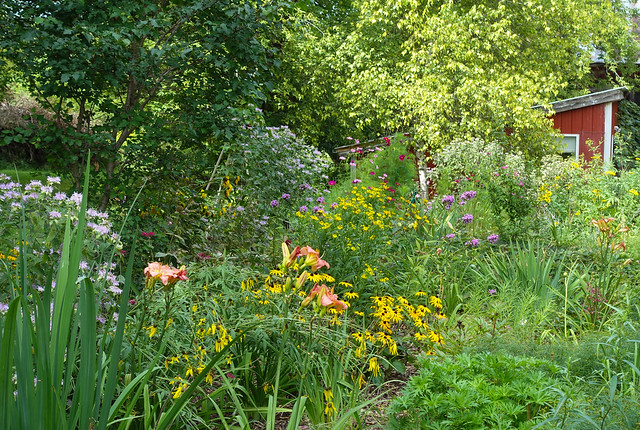As I continue work on my writing project, I sometimes step back and wonder how a reader would react to different events described therein. Whether he or she would feel that they would have done things differently. Whether opinions would form as to which course of action is the better one. For me, there are obvious terribly wrong directions and terribly right ones too, but it seems that most behaviors fall toward neither extreme. They are what they are. People squeezing by, finding a way to make it to the end of the day without completely falling apart in despair. And if in the course of that run they find themselves smiling, well, good for them! In my mind, one mark of a good day is when you look back and find that you have had quite a number of opportunities for a wide grin. The sun was out and you didn't completely mess up. How wonderful is that!
Today, it was easy to smile. Sure, when the rooster crowed, Ed fidgeted slightly and then mumbled something that sounded like "sleep." So I let him rest. But rising with the cheepers isn't necessarily a bad thing. Even if the sunrise is a little muted by a band of clouds on the horizon.


(oreo, waiting for the sun to rise)
Then there is breakfast - so obviously porch material, since we are having another one of those spectacularly beautiful days (last one for a while, so let's really crank it up and enjoy it!).

(his grin is a tiny bit fake so that I'd put away the camera already)
There are, today, periods of writing and there are garden walks...

(toward the porch)

(toward the sheep shed)
...and Ed and I take many soothing breaks on the porch -- to munch on pickles, to sip a cup of coffee, to do a little clothes mending. All very peaceful. Very much in line with the quiet around us. (Perhaps I overstate the quiet: we do live along a rural road that gets its share of car traffic as it leads to a county park and a lake -- a favorite destination for boat people in the summer. But life at the farmette is removed from the road. All important activities fly off the internal courtyard. We try hard to concentrate our senses toward that space and for the most part, the effort pays off.)
In the evening, Ed bikes his Wednesday night bike loop and I'm home making chili, just to use up the rest of the old tomatoes. And as I stir all those beans, spices and tomatoes, I go back to thinking about how difficult it is to make choices when, in most instances, there isn't an obviously correct path, just many different ones, with many different outcomes and consequences.


Your first paragraph started me musing about decision making. I've thought of myself as a confident decision maker, I'm not a waffler, but I've realized that in some ways I've let my life just flow...
ReplyDeleteYou know, I live in the moment for the most part, savoring, and I feel content at the end of the day, and grateful.
But when you're like me, you sometimes acknowledge that you're letting life's current sweep you along, instead of steering the ship. My life since age 26 has been centered around our three sons, fitting in work like pieces of a jigsaw puzzle around my cherished home life. I feel satisfied knowing I was a strong loving mother, both of those adjectives important, and they all grew up to be three of the best men I know, and their father and my father are two more.
and I feel proud of being a pretty great preschool teacher, where I teach kindness, fairness, respect, right along with words and music and science.
As we approach retirement, though, I only regret that I didn't contribute more financially, never pushed myself, for example, to be a teacher of teachers...
I realize that if I had a do-over, I would make the same choices at that point in time...so no whining, I tell myself! But here I am doing the same thing again, moving forward, thinking "we'll see how life unfolds".
If I ever finish my book, you'll be one of the first I'll ask then -- if circumstances for you had been slightly different, would you have still sought a quiet family life? Or is it that you moved peacefully along because your life was, in fact, as you describe it, pretty near perfect?
DeleteOn the subject of preschool education, I should ask *you* what you think are the weak points of European childcare as described in "Bringing up Bebe." Disclosure: much of what you'll read there replicates an environment I grew up in (and still face when I go back to Poland), where children are *not* the center of every social gathering and where respect is as important a lesson as reading or writing. It's a cultural thing. My girls, to this day, will be the politest, carefully listening guests at any place where they are the young ones. The American (child centered) model, on the other hand, they say builds stronger self esteem and extreme confidence. They say this country was built on that kind of hutzpah! So, how firm are you in incorporating respect into your curriculum? Because the parental expectations here, from my European perspective, are rather low in this regard... I'm genuinely curious.
Must read Bebe
DeleteJust a couple of thoughts (since I haven't read that book yet, and I usually have little patience with other people's stories of their child-rearing experiences - I never read the ever-proliferating columnists.)
DeleteI think Americans, generalizing here of course, have a tremendous work ethic that sometimes is manifested in competitiveness in their parenting. I think a lot of parents are wise enough to see this and avoid that trap. Our work ethic must come from the striving immigrant experience, and even prior to that: look who emigrated - the movers and shakers, the risk rakers, the bold. The passive ones stayed home and took whatever was coming. I think that is true today too. The Mexican families I have known are superb.
One sad fact in modern parenting is that a child is, for some needy and self-absorbed parents, simply an extension of themselves. Thus the proliferation of princesses.
The big picture, as I told my parents at orientation this week, as I do every year, is one of great optimism. The wonderful children I have loved and their caring families give me hope for the future. Sometimes the parents have tears in their eyes when I talk about the kindness of children that we are raising, and that shows me how deeply they feel it, that they want to raise a good citizen of the world.
Can I send my grandchildren to your classroom *please*?! :)
DeleteYes, I agree with the competitiveness. Europeans notice this about Americans. It would be unimaginable to push for a different balance and quality of life here. Americans value individual success and they want to see their kids succeed. Be the best athlete. Most popular girl. And somewhere in there -- academic star, though I swear, it takes third billing.
And living here, you get sucked into it. I know it happened to us -- especially to my husband who was supremely competitive, but I have to take responsibility for some of it too. I was the one who taught them to read before preschool (they were so willing!) and who taught them algebra at home in third grade (it was fun!) and who took my little one to ballet (she was so good!), bought them good violas and violins (we had no money those days). I was the one who rehearsed play lines with them when my baby girl landed the part of Juliet and her sister was a (very young!) Romeo.
But then it stopped being fun and I stopped. Right after elementary school. I felt that something else was happening around me -- something that I didn't fully understand. I hadn't fully grasped the truth about American middle schools (cliques!) and high schools (I had lost my girls to a mad world of academic college entrance competition).
I know that the running hypothesis is that parents here want success for the kids because these kids are better versions (extensions) of themselves. I'm not comfortable with that explanation. As a young adult,I had had my own rich world of experiences -- ones that were broader than my girls, limited to their Madison world, could ever have. I skipped grades and went to interesting schools and I was a self made kid -- my parents were a bit out to lunch when I was growing up. I wasn't looking at my kids to be a better version of myself. Though I did want them to be more hardworking than I was in school! And they were.
And, too, on the flip side, every parent -- you too! -- will *always* see their kid as a bit of an extension of their family. You, Joy, may not crave successes of an athletic/academic/social status type, but you want your kid to succeed in leading a rich and fulfilled life. Of course you do! And I do too!
I think the princess stuff, the *child king* as it were, comes from something else and that's why I pointed you to that book -- it's only on the surface about childrearing. It's really about cultural differences. I think the culture here follows the cult of the individual and in many European countries (France, Poland, but not England!) it follows the cult of the collectivity. You are part of an entity there. You must put aside your own personal tastes sometimes to function well in a group. A family unit. A classroom. In a restaurant. Etc. And so you'll never have the princess. It's an anathema to the way we work as a society. In Poland, when I visit with my friends, they often invite their adult daughters to join us for dinner. They come, now with their baby children. They will sit at the table, and even now, sit quietly, listen, say nothing unless they are asked something and then they offer witty but short comments. This is so different than if you have kids present in an American get together! So different! And still the Polish parents complain that their kids are too self-centered, too greedy, not giving enough etc etc. It's a mindset that is completely missing here.
And I'm not saying one is better than the other. Frankly, I think both cultures stand to learn from each other. When you have one that is too rigid and one that is too individualistic, surely the truth must lie somewhere in between!
In your second paragraph, everything you cited sounded just wonderful to me. You help them step up to another level, and another, if they are excited by it. And see how successful they have been. Now they have a wider range of options as their lives move forward.
DeleteElementary teachers called my sons "my little dictionary" and "my little encyclopedia". They always wanted to know more and I kept providing more ways for them to learn. (Haha, they weren't beaten up on the playground for this! Being smart is not a downer in this neighborhood)
I find it interesting that our three boys went in such different directions, starting from the same environment and with approx. the same IQ ( yes I realize the limitations of testing)
One is a doctor (research and teaching), one manages a hugely busy and popular sports bar, and one is a self-employed blues musician. Really! So different! And all three best buds when we get together.
That last sentence says it all. THAT, my dear is the challenge! THAT's the collectivity (in your case -- sibling, with parents, too) that trumps individualism. Bravo. They didn't just get there (being best buds). You made it a priority and you showed them how.
DeleteI'm reminded of the first sentence I said to my *terminal illness* psychologist 2 years ago. "I've made so many missteps." He laughed a comforting laugh and said, "It means you were living life." I liked the simplicity of his words. But the truth is that I'm a TERRIBLE decision maker. I can blame no one else because most my life I've been a committee of one. Terrible. Yet, I look back and know that if given the opportunity to delete any element in my life... a chapter, paragraph, or even a sentence... I wouldn't be me. Mine has been a broken road (I borrow that phrase I adore) and will let you complete the metaphor because I suspect it speaks to all of us. I've been away from home for nearly a month - during a period when much decision making has been required. I take a deep breath and know it makes no difference where I am during this pivotal time because the power of most decisions has been taken away from me, which is divine. I can focus my energies elsewhere. Don't be fooled by my choice of words here - they seem a bit shaded in despair - and my life is anything but that, because of an important decision I made several years ago... that each footfall will land with gratitude. xo
ReplyDeleteLovely words and thoughts behind them. I think, I, too, have been a terrible decision maker except when I was a good one! Let me move on to your second comment...
DeleteExactly right, Irene! Change any element of your life and you wouldn't be the "you" that you know now. Your journey has brought you to the here and now. I love what you said, to paraphrase, may each footfall land with gratitude. That is something I am mindful of, have to remind myself sometimes! but a worthy intention.
DeleteThanks, Nina & Joy.
DeleteIs there a post where you write about your book?
ReplyDeleteI almost don't remember when I *haven't* been writing about my book project! Long time Ocean readers are probably sick of my mentioning it! :) I started it nine years ago, but it was with many spurts and interruptions. One reason for my early retirement (at age 60 this January) was so that I could finally finish it. I just today looked at the number of written pages (were they to be converted to book format) and it is now at 320. I haven't added much since my retirement, but I am constantly editing and rewriting it. The subject? Growing up in post-war Poland. It literally tracks my life from age 0 to 18. I actually did live in NY for six years in the middle, which adds an interesting perspective, I think. I never thought I had an important or fascinating life, but I have lived in important and fascinating times and so I've felt that the story needs to be out there. That period is shrouded in too many unknowns and misconceptions, especially for those who know nothing about life under so called communism. In any event, it's been wonderful putting it down on paper, so to speak.
DeleteFabulous! Any previews?
ReplyDeleteI've been pulling together and culling my journals - no formal format yet. Fiddle-faddled. May engage someone to assist. My working title: Half Past a Freckle. :) I believe just about everyone has a story to tell, but not everyone can write it. The compiling is daunting. I've caught the hubcap and now don't know what to do with it!
I do agree with that perspective -- everyone does have a story to tell, but I always emphasize the fact that my story is not special. It's a little out of the ordinary because I had the privilege of leaving Poland as a child and then coming back to it. Few people did that. But I wasn't in any way more unique than the next person. I just happen to know what Americans (others?) think of Poland from that period and I thought that supplements to those images were in order!
DeleteI hope you do find an agreeable format. It's a big decision, but once you feel comfortable with one, don't look back!
I suspect your story is very very special. *laughing* Sounds fascinating. Is it a blend of historical and catharsis? Memoir-ish? The concept of personal perspective is interesting and can be tricky. For example, I could write my truth about an event in my family's life and my sister's version would be vastly different. My truth is so different than my sister's. One of my favorite journal entries focuses on an *insult* my sister hurled at me. When she said I was just like our mother she considered her words the ultimate insult. I smiled and embraced the comment as one of the most marvelous compliments ever. My sister and I have never owned the same truths. Many who write memoirs face this - Jeannette Walls comes to mind. Gah. I'm yakking. I just find it fascinating.
DeleteIt's not catharsis.
DeleteIt has a little history, enough so that the context makes sense. Most people hardly know where Poland is on the map -- they have little idea of the country's history.
I am all too aware of different truths. I try VERY HARD not to evaluate, just to recall. Of course, what I recall is already subjective. Every autobiography is subjective. What I hope to have brought to it is an American subjectivity to Polish events. Meaning -- all my life I have alternated between feeling closer to a Polish sensibility and an American one (right now, the American one trumps). For the purposes of this story, it's helpful to have a little of both.
BTW, my mom wrote her own story -- a stream of consciousness about her life. She is still living and will turn 91 in a couple of months. She reads my blog, though, to my knowledge, not the comments. Her own recording of many of the events is like a journal. I hope I have avoided that.
Sounds marvelous! You inspire me to push forward with my own efforts.
ReplyDeleteI inspired my mother to write her story down and for better or for worse, she did it! Or, she is now on the last chapters. Hers is a one draft effort -- she hand writes, without pause or correction. She has had tremendous satisfaction from the effort. And, the judgments and commentaries notwithstanding, my sister and I are glad that she did it. Though it reads like the biggest soap drama, it is full of her personality. And that is valuable.
DeleteGo to it, Irene Bean!